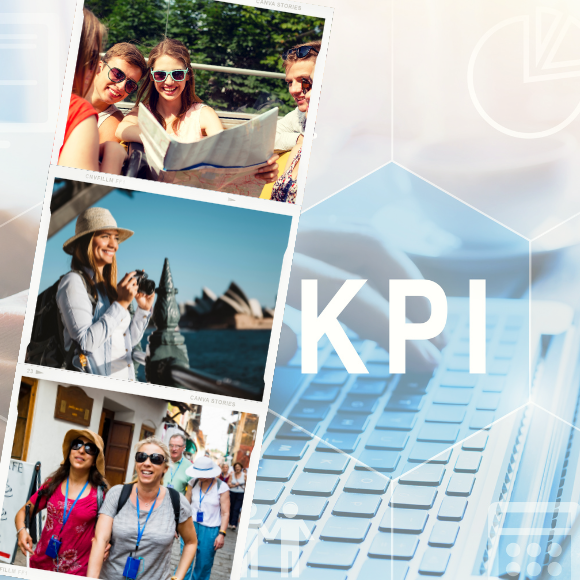Six Key Performance Indicators Every Tour and Activity Company Should Measure

Key Performance Indicators for Every Tour and Activity Operators
A Key Performance Indicator (KPI) is any measurable value used to evaluate the performance of an organization and its objectives. Tracking KPIs allows tour, activity, and transport operators to make effective decisions and create competitive strategies based on their previous performance. They’re not just for big corporations. Companies of all sizes can benefit from knowing precisely how to judge the success of their operation and its goals.
Tour and activity operators should identify the right KPIs for their business to stay ahead of their competition. These critical performance indicators can give you insights to grow your business and take it to the next level.
So, here are the most important key performance indicators for tour and activity operators to track.
Bookings
Tracking your bookings is vital in measuring the overall success of your marketing efforts and business growth. And, to get the bigger picture, you need to get the reports on all these aspects:
- Total booking volume: Gives you a bird's eye view of your performance compared to previous years.
- Booking by channels: Gives you an idea of how different sales channels (like online, phone in/walk up, or online travel agencies) work for you.
- Booking by days: Which days of the week are most popular? Can you charge more on those days and run promotions on the quieter days?
- Volume of cancellations: Gives you a better understanding of cancelled bookings, and it can help you design strategies to reduce cancellations and associated risks.

Revenue
Your revenue is the most crucial KPI determining whether you had a successful season. Beyond general analysis, look further into the sources of revenue as it lets you know where to invest your marketing efforts in the next season. Do not forget to factor in promo codes and discounts when you assess profits.
- Online Vs Offline Revenue: Did online bookings bring in more revenue than offline bookings (for example, walk-up or call-in bookings)?
- Revenue from upselling: Did your upselling strategy work? How much money did you make from upselling other products/activities to existing customers?
- Revenue from sales channels: Evaluate revenue from each sales channel. For example, check the balance sheet of bookings from OTAs to ensure that OTAs' commission fees didn't exceed your planned cost of acquiring customers.
- Profitable tours: Analyze which tours or activities are the most beneficial. This way, you could decide the one that needs the most marketing in the coming season.

Distribution
Relying on various channels indeed helps you reach millions of people without draining your resources. However, you should keep analyzing these sales channels' performance to ensure they bring you more business.
Keep these questions in mind when you do a postmortem of your distribution channels:
- Which sales channels generate the most sales?
- Do you need to cut off ties with OTAs or any other channel?
- Which distribution channels brought new customers?
- How diverse are your sales channels?
- Are you relying on one or multiple channels to sell your activities?
- Would running a promotion with an OTA sales channel help?
Customer Acquisition Costs
Customer Acquisition Cost (CAC) is a vital business metric that measures the total cost of your sales and marketing initiatives to acquire new customers over a specific period. CAC enables you to measure your sales and marketing expenses (such as ad spend), which is a key element of your financial performance.
Sometimes you may notice that bookings from referrals and repeat customers brought more revenue. That means you likely didn't spend much to acquire those customers.
By looking into CAC, you will be able to determine whether the money you spent on ads and other sales initiatives resulted in profitable bookings. It will also help you eliminate non-essential marketing spend. If you could lower CAC, the company can be more profitable in the long run.
Conversions & Traffic
Website traffic: Learning in-depth about your website visitors' demographic, location, and devices will be beneficial for your future marketing strategy. What pages do visitors look at most? Can the visitor book directly from that page?
Conversions: Conversion happens when a customer completes a goal on your website, in this case, when the customer makes a booking on your website. Try to find out—How many of your web visitors turned to bookers? How many of your visitors did leave without completing check out?
Engagement: Look at your social media posts. Also, if you have adopted email marketing, go back and check the open and click rates. Evaluate the leads you got from social media and email marketing.
Customer satisfaction
Guest reviews are immensely valuable to any tour or activity business. Take a look at the reviews left by the customers.
Positive reviews lets you know the areas you are doing well. And negative reviews can tell you where your company needs to make improvements to increase customer satisfaction and attract new guests. You can use platforms such as Bazaarvoice or Yonder to view reviews collected in one central place.
If you want to know more about reviews, we have covered the best practices in collecting guest feedback and responding to negative reviews.
Final Word
Insightful KPIs give you a better picture of your strengths and weaknesses. They can be the greatest learning tool to help you grow your business.
While reviewing key performance indicators, it's also essential to revisit your booking system. Make sure that your booking system meets your expectations and enables you to quickly access your KPI data. For example, Zaui Software has reports, visual insights, and report-building tools to easily access and visualize all corners of your business.
If you want to revisit your booking management system or go through the process again, our ebook on Choosing a Booking System can help you. This guide breaks down the key considerations and essential questions to ask when shopping for the best-in-class booking management system and how to finalize your choice.
Buyers Guide: How to Choose the Right Booking Software for Your Business
Related Posts

Zaui’s New Booking Policy Toolkit: Flexible Cancellations, Smarter Revenue Protection
Should you add a booking fee? Discover how this strategy can impact your revenue and customer satisfaction in our expert analysis.

Passing Booking Fees: A Smart Revenue Strategy or Customer Turn-Off?
Should you add a booking fee? Discover how this strategy can impact your revenue and customer satisfaction in our expert analysis.

How to Start a Tour Business in 2025: Practical Guide
Starting a tourism business is an exciting journey into a landscape full of potential. Travellers are always looking for new adventures, and there is no shortage of niches to explore in the tourism industry. The question is: how do you carve out your place in this vibrant sector?


Frequently Asked Questions
No. Zaui’s pricing is fully pay-as-you-go. You aren’t locked into any long-term contract. In fact, leading platforms emphasize this flexibility. Similarly, Zaui lets you start and stop anytime. You can change or cancel your plan freely, so you only pay for what you use.
Absolutely not. Zaui’s pricing is 100% transparent. We disclose all fees up front with no surprise add-ons or “sneak-in” charges. In fact, Zaui’s plans include all core features “without additional fees”. Industry experts note that hidden fees undermine trust so we avoid them entirely. All costs are clearly outlined in our pricing, and there are no extra setup charges or undisclosed surcharges at checkout.
Zaui integrates with major payment gateways (e.g. Stripe) so you only pay standard credit-card processing rates (roughly 1.9%+$0.30/transaction) and we don’t mark them up. Only the published platform commission is added on bookings. You also have full control over who pays the commission, we let you decide whether to absorb booking fees or pass them on to customers. In short, you’ll only pay the transparent booking commission and normal gateway fees, nothing extra.
Your onboarding and support are included in the price. We provide white-glove setup help and ongoing 24/7 support at no additional cost. Our dedicated customer-success team will guide you through every step, ensuring a smooth launch. You won’t pay extra for training or service other than the onboarding fee; it's all built into your plan.
You can schedule a free demo with our team. Our Zaui ninjas will walk you through pe how Zaui can work for your business and highlight opportunities to grow with our advanced features all without any upfront payment. This way, you can feel confident it’s the right fit before making a commitment.
Of course. Zaui’s plans are fully flexible. You can upgrade or downgrade at any time to match your needs, without penalties. You can move to a higher tier or back down easily, and your billing adjusts automatically.
No. Zaui does not charge its commission on offline/manual bookings. “No fees on offline bookings” You only pay the commission when a booking is processed online through our system. Manual reservations (or bookings from partner channels we set up for you) incur no extra platform fee. (30% or less)
All of Zaui’s core features are included in your plan at no extra charge. We believe in value and transparency: Zaui provides over 15 advanced features (Google Things to do, reporting tools, marketing tools, reports, etc.) at no additional cost. Many competitors charge extra or require higher plans for the same features, but with Zaui you get the full suite of tools in one package. Any optional add-ons (if any) will always be clearly listed and optional there are no surprise paid upgrades for standard features.
Each Zaui plan is designed for clarity and fairness, following industry best practices. You can trust that our pricing is transparent and flexible, with the support you need built in.
Extra accounts- unlimited agents, resellers, user



